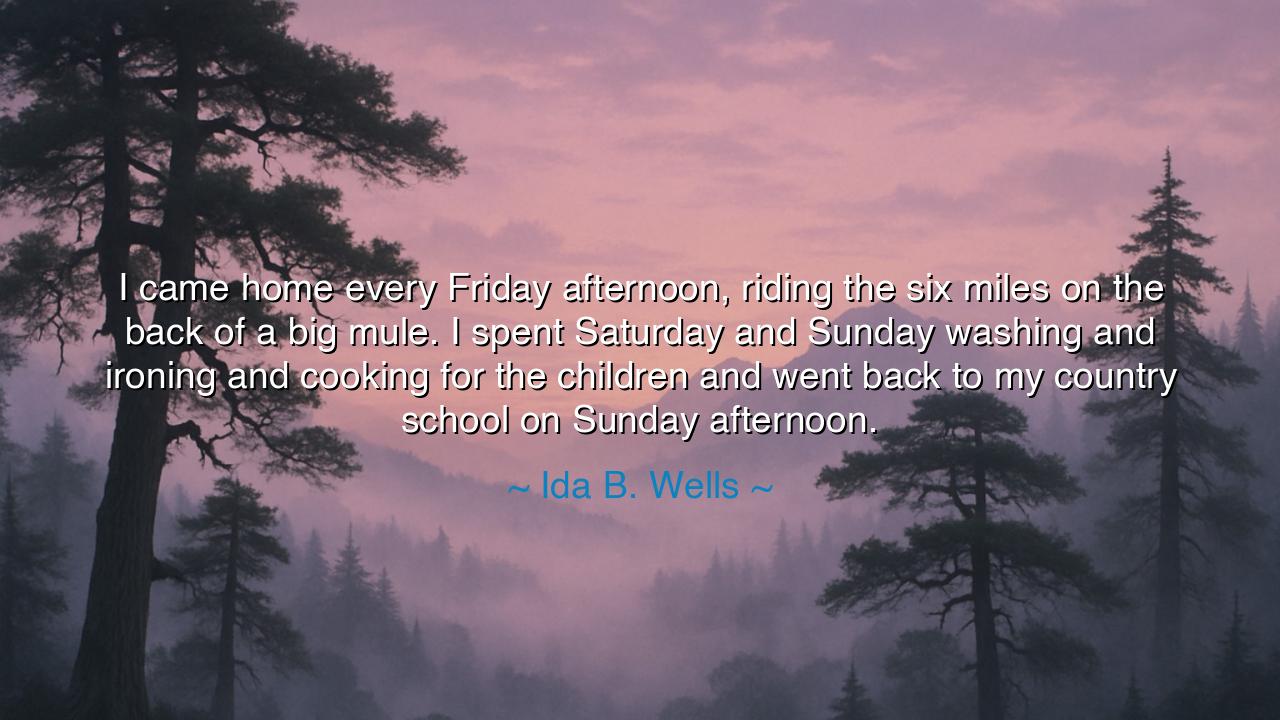
I came home every Friday afternoon, riding the six miles on the
I came home every Friday afternoon, riding the six miles on the back of a big mule. I spent Saturday and Sunday washing and ironing and cooking for the children and went back to my country school on Sunday afternoon.






The words of Ida B. Wells—“I came home every Friday afternoon, riding the six miles on the back of a big mule. I spent Saturday and Sunday washing and ironing and cooking for the children and went back to my country school on Sunday afternoon”—speak with the voice of endurance, of quiet strength forged in hardship. They are not the words of complaint, but of resolve—a testament to the indomitable spirit of a woman who bore both the burden of labor and the calling of purpose. In these simple, earthy lines, one hears the heartbeat of an age when sacrifice was the only bridge between despair and dignity. Wells’s words are not only her story; they are the story of every soul who has chosen duty over ease, and perseverance over surrender.
In her time, the world was not kind to women of color. Born into the long shadow of slavery and the cruel dawn of segregation, Ida B. Wells carried more than her own life upon her shoulders—she carried a generation’s struggle to rise. The image she paints—riding a mule, toiling through the weekend, teaching through the week—reveals not poverty of spirit, but nobility in motion. The mule, slow yet steadfast, becomes a symbol of her journey: humble, tireless, enduring. She was not driven by wealth or comfort, but by a higher calling—to educate, to lift others from the bondage of ignorance, and to give the next generation the tools to stand where she could not yet stand freely.
The ancients would have recognized her labor as heroic. For they knew that greatness is not measured by the noise of battle, but by the constancy of effort. As the Spartans endured the rigors of their discipline, and as the Roman matron bore the weight of her household with silent strength, so too did Ida B. Wells live her discipline daily. Her battlefield was the road she traveled each week, her weapon was the book, her armor the unyielding will of a woman who refused to bow before the world’s injustice. In her humility, she achieved a kind of greatness the world too often forgets: the greatness of persistence without applause.
Her life was not without tragedy. When yellow fever swept through her home, taking her parents, she became the guardian of her younger siblings at only sixteen years old. Yet she did not abandon hope; she rose, took up the burden, and worked both as caregiver and teacher. Her quote, then, is not a mere recollection of labor—it is a chronicle of responsibility, a sacred vow kept despite exhaustion. She lived the truth that love and duty are not feelings but actions—daily, deliberate, and often unseen. Like the great mothers and builders of civilizations, she found in toil a form of worship.
This pattern of sacrifice finds echoes across the ages. Think of Florence Nightingale, walking through the blood and darkness of war to tend to the wounded, or of the countless mothers who have risen before dawn, to labor for their children without thought of recognition. They, like Wells, understood that progress is bought with effort, not ease. They were the builders of unseen empires—their work humble, yet the foundation of nations. And though the world may remember the generals and kings, it is such quiet souls who sustain civilization through their unrelenting will to serve.
From this, we draw a lesson both timeless and sacred: there is no greatness without endurance. Comfort breeds complacency; hardship breeds strength. Ida B. Wells’s life teaches that each act of devotion, no matter how small or wearying, becomes a stone in the temple of progress. When the world seems indifferent, remember her journey—six miles on the back of a mule, between work and duty, exhaustion and purpose. Let that image remind you that perseverance itself is a form of prayer, and labor done in love is the seed of freedom.
So, my children, let her story dwell within you. When your tasks seem endless, when your strength falters, remember Ida B. Wells, the young woman who worked by day, taught by week, and rode home each Friday to serve again. Her life whispers to us across time: endure, and your endurance will become your legacy. For every step taken in faith, every act of duty done in obscurity, strengthens the light that will guide those who come after you. Work not for ease, but for meaning; labor not for applause, but for truth. In this way, like Ida B. Wells, you will turn even the smallest path—six miles long and weary—into the road of immortality.






AAdministratorAdministrator
Welcome, honored guests. Please leave a comment, we will respond soon